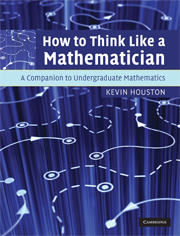Book contents
- Frontmatter
- Contents
- Preface
- I Study skills for mathematicians
- II How to think logically
- III Definitions, theorems and proofs
- IV Techniques of proof
- V Mathematics that all good mathematicians need
- VI Closing remarks
- 32 Putting it all together
- 33 Generalization and specialization
- 34 True understanding
- 35 The biggest secret
- Appendices
- Index
34 - True understanding
from VI - Closing remarks
- Frontmatter
- Contents
- Preface
- I Study skills for mathematicians
- II How to think logically
- III Definitions, theorems and proofs
- IV Techniques of proof
- V Mathematics that all good mathematicians need
- VI Closing remarks
- 32 Putting it all together
- 33 Generalization and specialization
- 34 True understanding
- 35 The biggest secret
- Appendices
- Index
Summary
In mathematics you don't understand things. You just get used to them.
John von Neumann (1903–1957)How do you know when you really understand something in mathematics? This is very hard to answer. Often one can have the feeling of understanding and yet in attempting exercises and problems one's lack of understanding soon becomes obvious. In this chapter we will list ways of demonstrating understanding.
Understanding definitions
You understand a definition if you
can state it precisely,
can state it in your own words,
can give concrete examples of it, including trivial and non-trivial examples,
can give non-examples of the definition,
can recognize it in different and unfamiliar situations,
know theorems in which it can be used,
know why it can be used in those theorems,
know why this particular definition is made,
know other similar definitions of the same word and know the differences between them.
The last item on the list occurs because different mathematicians use different definitions and this has important consequences for theorems. By adding in an extra hypothesis to a definition many theorems become easier to prove.
Understanding theorems
You understand a theorem if you
can state it precisely and in your own words,
can give concrete examples of its use,
understand its proof,
can apply it in new and unfamiliar situations,
can give a counterexample to statements given by weakening hypotheses,
[…]
- Type
- Chapter
- Information
- How to Think Like a MathematicianA Companion to Undergraduate Mathematics, pp. 252 - 254Publisher: Cambridge University PressPrint publication year: 2009

